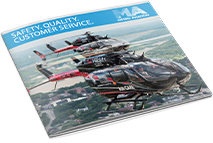Safety above everything
Metro Aviation is committed to safety across the board. As one of the first three operators to enter Level IV of the FAA SMS Pilot Project for Part 135, and the first completion center to enter Level IV for Part 145, we are continually looking at ways to improve our processes and make our industry safer.
FOQA Program
Metro’s Flight Operations Quality Assurance (FOQA) program began in the summer of 2017. Metro’s entire fleet is equipped with flight data monitoring (FDM) software. Our team reviews defined event sets to initiate positive changes in operations and training, resulting in more compliant and standardized operations.
Click here for more information
CARB Certification
Metro achieved initial Commercial Airlift Review Board (CARB) approval in 2015 and has successfully completed subsequent onsite inspections. All air services that carry Department of Defense (DOD) personnel must be approved. Approval is awarded by successfully completing a bi-annual onsite survey/audit by CARB/DOD maintenance and operations inspectors.
Mike’s Four Buckets
Several years ago, Metro Aviation President Mike Stanberry recognized the root causes of the majority of air medical accidents, even before the heightened interest in our industry by the FAA and NTSB.
- Pilot Vision & Situational Awareness
- Pilot & Maintenance Training
- Safety Management System
- Pilot Oversight
SAFETY PRIORITIES
Pilot Vision & Situational Awareness
Metro was the first major air medical operator to equip its entire fleet with Night Vision Goggles (NVG). All aircraft also have HTAWS (Helicopter Terrain Awareness Warning System) and all Metro pilots complete Metro’s inadvertent Instrument Meteorological Conditions (IMC) training program.
Training
All Metro pilots complete initial and annual aircraft specific, scenario-based training in simulators that are able to simulate IFR (Instrument Flight Rules) and IIMC (Inadvertent Instrument Meteorological Conditions) environments and situations. Pilots also receive education in Human Factors and Decision Making, to include Crew Resource Management (CRM) and Crew Coordination.
Maintenance Technicians receive factory-equivalent maintenance training and attend courses that are both airframe and engine specific.
Lead pilots and Technicians attend annual seminars at Metro Aviation.
For more information on the training center, click here.
Safety Management System
Metro’s Safety Management System (SMS) is a closed-loop system for all aspects of safety.
Initiated in early 2009, Metro was among the first three operators to enter Level IV (Part 135) in January 2014 and the first to enter Level IV (Part 145) in May 2014 of the FAA SMS Pilot Project. Level IV was the highest level of the program. The program closed when the SMS rule was published in 2015 and Metro entered the FAA’s voluntary SMS program.
- Active participation in FAA voluntary SMS program CFR 14 Part 5 (SMS regulation for airlines)
- FAA-recommended voluntary Line Operations Safety Audit (LOSA) completed in 2017
- FAA voluntary Aviation Safety Action Program (ASAP) for pilots and mechanics initiated in 2019
- Participation in FAA voluntary sharing of safety data through the Aviation Safety Information and Analysis System (ASIAS)
Pilot Oversight
Metro’s enhanced Operational Control Center (OCC) is an advanced, collaborative centering point for all operations. Metro’s OCC, as well as our air medical program’s Communication Centers and Metro pilots, utilize Complete Flight to create flight requests, analyze risk, evaluate flight details and receive OCC approval of each flight.
OCC flight follows every Metro flight in real time via satellite tracking through Outerlink Global Solutions.

